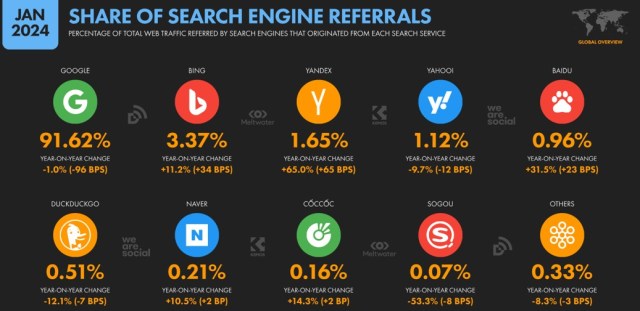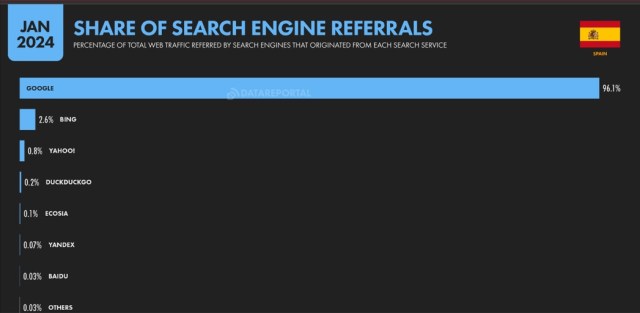The Internet has changed our lives, altering our habits in many ways, from business to leisure. Since its birth, it has evolved enormously and has undergone constant modifications that have changed the way we use it, with search engines and browsers playing a major role.
But if there is one thing that is enormously established and linked to the Internet to the point that some people can even consider it as a synonym, it is Google, the main search engine of our days.
But has it always been like this? What other important search engines have existed throughout the history of the Internet? Which was the first?
History and evolution of the main search engines
Nowadays it is unthinkable to think of an Internet without search engines, but when the first website in history was born, this was not the case. Let’s take a look at the origin and evolution of some of the most notable search engines in history.
Wandex, the first search engine… without wanting to be one
Mathew Gray, a scientist at the Massachusetts Institute of Technology (MIT) developed Wandex with the intention of creating a scientific tool with which to measure the size of the Internet for purely academic purposes, quantifying the web pages contained on the Internet and consequently their size.
Subsequently, once the application engine had been developed, the team at the academic institution realised that the robot was also capable of reading URLs and indexing them, which is why this is considered to be the origin of searches on the network of networks.
Late 1990s: the search engine boom
In the late 1990s, Aliweb, WebCrawler or AltaVista became very popular. Aliweb was announced in 1993 and presented a year later and, unlike Wandex, which only searched by URLs, it also began to search the contents of pages. Archie Like Indexing for Web, which is its full name, is still active today.
Also from 1994 and still active today is WebCrawler, a meta-search engine that combines searches from other popular search engines and at the time was the first to offer full text searches.
AltaVista (dissolved in 2013) dates from the same period, specifically from 1995, and from its beginnings it presented a simple to use front page, unlike other search engines of the time. It had the added characteristics of having been the first search engine to incorporate multimedia content, and also had the milestone of having a record 61 patents related to Internet searches.
The kings of the 21st century: Google, Bing and Yahoo!
Also born in the 1990s but taking over the world’s top search engine positions in the 21st century, Google, Bing and Yahoo! are also part of Internet history.
Yahoo! Search was also born in the mid-1990s, owned by Yahoo! and originally started as a web of other sites, organised by hierarchy, as opposed to a searchable index. Hugely popular as a portal in the late 20th and early 21st centuries, it now uses Bing search engines.
This is precisely Microsoft’s search engine, the second most used in the world (as we will see below) and the youngest of all those we are going to analyse. Although it is true that it was born as such in 2009, its origins date back to 1998, under the name MSN Search, which was later followed by Windows Live Search and Live Search.
But the overwhelming dominator is Google, with a global market share of over 90%. Founded in 1998 by two young Stanford University students, Larry Page and Sergey Brin, who dreamed of being able to download the entire web onto computers.
Google’s success has transcended its origins as a search engine and the company (now Alphabet) has products and services that are part of our daily lives, such as YouTube, Google Maps and Gmail.
Most used search engines in the world in 2024
The total number of people using the Internet worldwide will reach 5.35 billion in 2024, which represents 66.2% of the population, with an increase of 97 million people compared to 2023, according to data from the Digital 2024 report.
It is true that, although slight, there has been a slight drop in the use of search engines. Specifically, from the third quarter of 2021, when 83.6% of internet users used a search engine, it has gone down to 80.7% today.
According to this same study, we can find out which search engines are currently the most used:
- Google accounts for nine out of every ten searches, 91.62%, although it is true that it has suffered a slight decrease of 1% since the previous year.
- Bing remains in second place, a distant second, with 3.37% of the total and a growth of 11.2%.
- Yandex grew by 65% to reach 1.65% of the world’s total search engine usage, with the largest share in Russia.
- Yahoo! remains at 1.12% after falling by 9.7% compared to the previous year’s figures.
- Below 1% are Baidu, DuckDuckGo, Naver, Côc Côc and Sogou, with 0.96%, 0.51%, 0.21%, 016% and 0.07% respectively.

Most used search engines in Spain in 2024
If globally the difference between the most used search engine and the next most used is abysmal, in Spain it is even greater: Google is used by 96.1% of Internet users compared to 2.6% of Bing users.
Behind are Yahoo, DuckDuckGo and Ecosia with 0.8%, 0.2% and 0.1% respectively, ahead of Yandex and Baidu with a meagre 0.07% and 0.03%.










